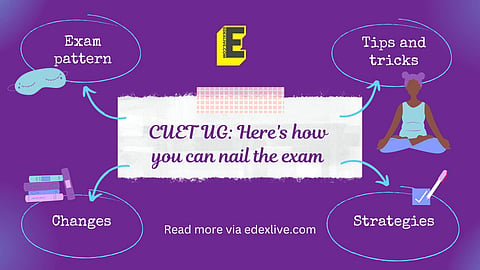

The newly launched Common University Entrance Test (CUET) is about to enter its second year but several students aspiring to get admission to undergraduate courses through the common examination still have a lot of questions about the exam pattern, admission process and so on.
The inaugural year of CUET received mixed responses from experts and students as it was filled with technical glitches and clashes in the schedule. However, the University Grants Commission (UGC) has assured that the glitches have been fixed for the upcoming CUET-UG 2023. Now, let’s see what experts and educators say about other concerns, questions.
Changes in exam pattern, what to expect?
This year, the NTA has introduced some major changes in the exam pattern like a reduced number of questions in each section, an increased number of subjects that a candidate can choose, and a few others.
On the other hand, the experts say that these changes in the exam would not affect the students in terms of difficulty level or exam preparation.
“The exam pattern has not changed that drastically. There are a few changes but the backbone of the papers will be similar,” explained Dr Gaurav Kaithwas, Associate Dean of academic affairs at Babasaheb Bhimrao Ambedkar University (BBAU) and a CUET expert.
The experts, however, added that since it is only the second year of CUET-UG, the students can expect new questions, especially in General Aptitude (GA) Test.
“I am not expecting a lot of change in the language paper or the domain subject papers. However, it is hard to say what kind of questions will be in GA in terms of question types. For the next two-three years the paper will only reinvent itself,” said Surabhi Modi Sahai, CEO, CUET Possible, an EdTech platform for CUET preparation.
Limit your subject choices
Although the NTA has increased the number of subjects to which candidates can apply from nine to a total of 10 subjects, experts advise keeping the choices minimal for better focus.
“One thing that the students have to bear in mind is not to take too many domain subjects just because they have a choice. In the end, the domain score of only three subjects will be considered. Choosing too many subjects will not give you any added advantage. Rather than writing too many papers, it is better that you do well in the three minimum domain papers,” said Sahai.
The experts advised that the students should keep in mind the colleges and courses they would like to pursue while choosing the subjects and stick to the syllabus of these specific subjects only.
Is the competition increasing?
As compared to 2022, many state and private universities have also joined CUET for their admission process this year. Though the number of applicants has also increased, the candidates will have more options this time, experts explain.
“With more universities joining this year, the students can explore more colleges and universities based on their scores. If they do not get into one college of their choice, they will have more options so in that sense, the competition has eased for the students,” said Dr Gaurav Kaithwas from BBAU.
However, if your goal is to get a seat in top universities like Delhi University (DU), Jamia Milia Islamia, or others, you might have to face tough competition this time, added Surabhi Sahai.
Which courses are more competitive?
Measuring competition in CUET is not that simple as different courses might have different competitions on the basis of popularity, number of seats, number of applicants, and other factors.
Let’s see what are some of the most popular courses when it comes to undergraduate admissions might expect a higher cut-off this year.
Sreejith A, English Aptitude trainer and Business head at PrepAcademy, Kerala, said, “When it comes to CUET, the popularity of commerce and humanities courses are usually higher than science courses. The reason is that science students go for other entrance tests like NEET and JEE along with CUET. On the other hand, BCom, BBA, Economics, and English are some of the most popular courses among students in the other two streams.”
Securing a seat in these courses, especially in the top central universities, might be more challenging as compared to other courses.
“The popularity of courses among students has remained similar to what it was before CUET. For example, English Honours, BCom Honours, Economics Honours, History Honours are the most popular and we are getting students for these courses. In science, of course, Maths and Physics Honours are the most popular courses as they have more opportunities of getting scholarships and moving abroad,” Surabhi Sahai from CUET possible said.
Preparation tips from experts
When asked about what strategies the candidates can follow while preparing for the entrance exam to ensure a good score, the experts stressed focusing on basics and taking practice tests before the big day.
“CUET mostly consists of questions from class 12th NCERT, mostly direct formula-based questions. Application-based questions are minimal in CUET and they are not as complicated as what you get in NEET or JEE,” explained Purnachandra Rao, Director, Resonance Hyderabad Centre.
Moreover, the experts said that the candidates should be mindful of time while writing the examination.
“Completing the question paper within the time frame is very important. You should practice more during these last few weeks, especially sections like reading comprehension where students tend to lose more time in general,” explained Sreejith A.
Other than this, the experts added that while the questions in language papers and domain-specific papers will be mostly familiar to the students and based on their board syllabus, general aptitude can be something that the aspirants have never attempted before.
In this section of the exam, students are asked questions related to general knowledge, current events, general mental ability, general numerical ability, quantitative reasoning, and logical and analytical reasoning. Experts said that understanding paper patterns and types of questions might help the students get more familiar with the particular section.
